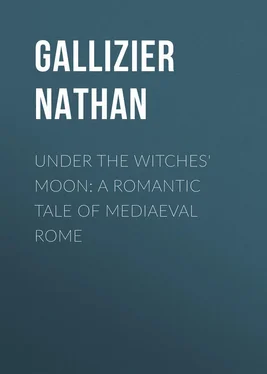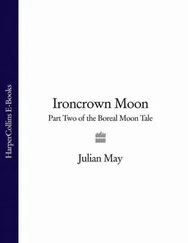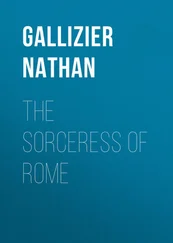Nathan Gallizier - Under the Witches' Moon - A Romantic Tale of Mediaeval Rome
Здесь есть возможность читать онлайн «Nathan Gallizier - Under the Witches' Moon - A Romantic Tale of Mediaeval Rome» — ознакомительный отрывок электронной книги совершенно бесплатно, а после прочтения отрывка купить полную версию. В некоторых случаях можно слушать аудио, скачать через торрент в формате fb2 и присутствует краткое содержание. Издательство: Иностранный паблик, Жанр: foreign_antique, foreign_prose, на английском языке. Описание произведения, (предисловие) а так же отзывы посетителей доступны на портале библиотеки ЛибКат.
- Название:Under the Witches' Moon: A Romantic Tale of Mediaeval Rome
- Автор:
- Издательство:Иностранный паблик
- Жанр:
- Год:неизвестен
- ISBN:нет данных
- Рейтинг книги:4 / 5. Голосов: 1
-
Избранное:Добавить в избранное
- Отзывы:
-
Ваша оценка:
- 80
- 1
- 2
- 3
- 4
- 5
Under the Witches' Moon: A Romantic Tale of Mediaeval Rome: краткое содержание, описание и аннотация
Предлагаем к чтению аннотацию, описание, краткое содержание или предисловие (зависит от того, что написал сам автор книги «Under the Witches' Moon: A Romantic Tale of Mediaeval Rome»). Если вы не нашли необходимую информацию о книге — напишите в комментариях, мы постараемся отыскать её.
Under the Witches' Moon: A Romantic Tale of Mediaeval Rome — читать онлайн ознакомительный отрывок
Ниже представлен текст книги, разбитый по страницам. Система сохранения места последней прочитанной страницы, позволяет с удобством читать онлайн бесплатно книгу «Under the Witches' Moon: A Romantic Tale of Mediaeval Rome», без необходимости каждый раз заново искать на чём Вы остановились. Поставьте закладку, и сможете в любой момент перейти на страницу, на которой закончили чтение.
Интервал:
Закладка:
Persephoné's touch roused her mistress from a day dream that had set her features as rigid as ivory, as she surveyed herself for a moment intently in a great bronze disk whose burnished surface gave back her flawless beauty line for line.
In Persephoné's gaze she read her unstinted admiration, for, beautiful as the Circassian was, she loved beauty in her own sex, wherever she found it.
Theodora seemed to have utterly forgotten the presence of the Grand Chamberlain in the anteroom, yet, in an impersonal way, her thoughts occupied themselves with the impending tete-a-tete.
Her life had been one constant round of pleasure and amusement, yet she was not happy, nor even contented.
Day by day she felt the want of some fresh interest, some fresh excitement, and it was this craving probably, more than innate depravity, which plunged her into those disgraceful and licentious excesses that were nightly enacted in the sunken gardens behind her palace. Lovers she had had by the scores. Yet each new face possessed for her but the attraction of novelty. The favorite of the hour had small cause to plume himself on his position. No sooner did he believe himself to be secure in the possession of Theodora's love, than he found himself hurled into the night of oblivion.
A strange pagan wave held Rome enthralled. Italy was in the throes of a dark revulsion. A woman, beautiful as she was evil, had exercised within the past decade her baleful influence from Castel San Angelo. Theodora had taken up Marozia's tainted inheritance. Members of a family of courtesans, they looked upon their trade as a hereditary privilege and, like the ancient Aspasias, these Roman women of the tenth century triumphed primarily by means of their feminine beauty and charms over masculine barbarism and grossness. It was an age of feudalism, when brutal force and murderous fury were the only divinities whom the barbarian conqueror was compelled to respect. Lombards and Huns, Franks and Ostrogoths, Greeks and Africans, the savage giants issuing from the deep Teutonic forests, invading the classic soil of Rome, became so many Herculeses sitting at the feet of Omphalé, and the atmosphere of the city by the Tiber – the atmosphere that had nourished the Messalinas of Imperial Rome – poured the flame of ambition into the soul of a woman whose beauty released the strongest passions in the hearts of those with whom she surrounded herself, in order to attain her soul's desire. To rule Rome from the fortress tomb of the Flavian emperor was the dream of Theodora's life. It had happened once. It would happen again, as long as men were ready to sacrifice at the shrines of Hekaté.
Unbridled in her passions as she was strong in her physical organization, an unbending pride and an intensity of will came to her aid when she had determined to win the object of her desire. In Theodora's bosom beat a heart that could dare, endure and defy the worst. She was a woman whom none but a very bold or ignorant suitor would have taken to his heart. Perchance the right man, had he appeared on the stage in time, might have made her gentle and quelled the wild passions that tossed her resistlessly about, like a barque in a hurricane.
Suddenly something seemed to tell her that she had found such a one. Tristan's manly beauty had made a strong appeal upon her senses. The anomaly of his position had captivated her imagination. There was something strangely fascinating in the mystery that surrounded him, there was even a wild thrill of pleasure in the seeming shame of loving one whose garb stamped him as one claimed by the Church. He had braved her anger in refusing to accompany Persephoné. He had closed his eyes to Theodora's beauty, had sealed his ears to the song of the siren.
"A man at last!" she said half aloud, and Persephoné, looking up from her occupation, gave her an inquisitive glance.
The splash of hidden fountains diffused a pleasant coolness in the chamber. Spiral wreaths of incense curled from a bronze tripod into the flower-scented ether. The throbbing of muted strings from harps and lutes, mingling with the sombre chants of distant processions, vibrated through the sun-kissed haze, producing a weird and almost startling effect.
After a pause of some duration, apparently oblivious of the fact that the announced caller was waiting without, Theodora turned to Persephoné, brushing with one white hand a stray raven lock from the alabaster forehead.
"Can it be the heat or the poison miasma that presages our Roman fever? Never has my spirit been so oppressed as it is to-day, as if the gloomy messengers from Lethé's shore were enfolding me in their shadowy pinions. I saw his face in the dream of the night" – she spoke as if soliloquizing – "it was as the face of one long dead – "
She paused with a shudder.
"Of whom does my lady speak?" Persephoné interposed with a swift glance at her mistress.
"The pilgrim who crossed my path to his own or my undoing. Has he been heard from again?"
A negative gesture came in response.
"His garb is responsible for much," replied the Circassian. "The city fairly swarms with his kind – "
The intentional contemptuous sting met its immediate rebuke.
"Not his kind," Theodora flashed back. "He has nothing in common with those others save the garb – and there is more beneath it than we wot of – "
"The Lady Theodora's judgment is not to be gainsaid," the Circassian replied, without meeting her mistress' gaze. "Do they not throng to her bowers by the legion – "
"A pilgrimage of the animals to Circé's sty – each eager to be transformed into his own native state," Theodora interposed contemptuously.
"Perchance this holy man is in reality a prince from some mythical, fabled land – come to Rome to resist temptation and be forthwith canonized – "
Persephoné's mirth suffered a check by Theodora's reply.
"Stranger things have happened. All the world comes to Rome on one business or another. This one, however, has not his mind set on the Beatitudes – "
"Nevertheless he dared not enter the forbidden gates," the Circassian ventured to object.
"It was not fear. On that I vouch. Perchance he has a vow. Whatever it be – he shall tell me – face to face – and here!"
"But if the holy man refuse to come?"
Theodora's trained ear did not miss the note of irony in the Circassian's question.
"He will come!" she replied laconically.
"A task worthy the Lady Theodora's renown."
"You deem it wonderful?"
"If I have read the pilgrim's eyes aright – "
"Perchance your own sweet eyes, my beautiful Persephoné, discoursed to him something on that night that caused misgivings in his holy heart, and made him doubt your errand?" Theodora purred, extending her white arms and regarding the Circassian intently.
Persephoné flushed and paled in quick succession.
"On that matter I left no doubt in his mind," she said enigmatically.
There was a brief pause, during which an inscrutable gaze passed between Theodora and the Circassian.
"Were you not as beautiful as you are evil, my Persephoné, I should strangle you," Theodora at last said very quietly.
The Circassian's face turned very pale and there was a strange light in her eyes. Her memory went back to an hour when, during one of the periodical feuds between Marozia and her younger sister, the former had imprisoned Theodora in one of the chambers of Castel San Angelo, setting over her as companion and gaoler in one Persephoné, then in Marozia's service.
The terrible encounter between Theodora and the Circassian in the locked chamber, when only the timely appearance of the guard saved each from destruction at the hands of the other, as Theodora tried to take the keys of her prison from Persephoné, had never left the latter's mind. Brave as she was, she had nevertheless, after Marozia's fall, entered Theodora's service, and the latter, admiring the spirit of fearlessness in the girl, had welcomed her in her household.
Читать дальшеИнтервал:
Закладка:
Похожие книги на «Under the Witches' Moon: A Romantic Tale of Mediaeval Rome»
Представляем Вашему вниманию похожие книги на «Under the Witches' Moon: A Romantic Tale of Mediaeval Rome» списком для выбора. Мы отобрали схожую по названию и смыслу литературу в надежде предоставить читателям больше вариантов отыскать новые, интересные, ещё непрочитанные произведения.
Обсуждение, отзывы о книге «Under the Witches' Moon: A Romantic Tale of Mediaeval Rome» и просто собственные мнения читателей. Оставьте ваши комментарии, напишите, что Вы думаете о произведении, его смысле или главных героях. Укажите что конкретно понравилось, а что нет, и почему Вы так считаете.












